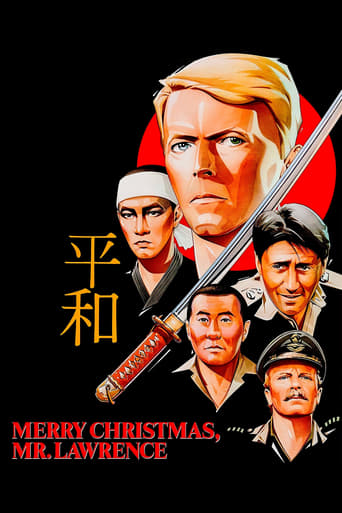

This great film by Oshima strikes me as a mirror reflection of his earlier work of avant-eroticism, In the Realm of the Senses. In both pieces, power and desire threaten, in different, competing ways, to usurp subjective humanity. The earlier movie took place just as the fascist Japanese war machine was fully consolidating itself. The self-effacing abandonment to libidinal joy is presented as the only way to escape a society that would crush the individual by controlling it. To completely abandon control of the self was the only way to escape control by the state. Unfortunately, both too much and too little power and control lead to death and/ or madness. In this later film, set predominantly during the war in Asia, power has already claimed subjectivity as its captive. Desire still reveals itself, but only through momentary cracks in power's control of the subject. Power must reassert itself all the more brutally after this lapse. Desire therefore results in the greatest suffering, albeit with none of the self-destructive liberation seen in Realm. The only real hope offered in Merry Christmas, however, still come from momentary lapses of power's control. This slight hope is not the result of desire, but of the intimacy that control accidentally engenders between captive and captor (both of whom are controlled).
... View MoreMerry Christmas Mr Lawrence is the kind of movie that takes a while to "digest" and integrate. Having seen it 33 years after its release, I don't think it looks aged at all. On the contrary, it is as visually interesting and well directed as anything today. And the score is absolutely fantastic; really. Where it is treated differently than most recent efforts on this topic of Japanese Prisons during Wold War II is that it's less visually violent. It is morally violent, but not as gruesome as A.Jolie's or Eastwood's recent movies. It's absolutely not missing by the way and the characters are some of the most fleshed out, multi faceted and complex I have seen in a long time. It's not an "easy" movie but it is well worth the effort and a very rewarding watch.
... View MoreAfter watched this film, I need to be alone (though I watched it alone) and clear my thoughts for a while, before I could write any words. Under a particular wartime surrounding, although flames of war has retreated as the backdrop, the predestinate individuals never get the chance to affranchise their innermost love, only leads a tragic story between a Japanese commander and a British slave. This might not be the greatest films ever made, but I cannot deny the emotional resonance it has impacted on me. Two superstars of the rock era at that time from west and orient respectively, David Bowie and Ryuichi Sakamoto's personal charisma works as the pillar of the film, their mutual feelings are constructed with an authentic and credible procedure, so that the whole film is way above just an unrequited love story.The background of Bowie's character with his relationship with his younger brother in their childhood is deftly portrayed too, which renders audiences another prospect which contrasts the Japanese prison camp setting. And his redemption to his brother was fulfilled eventually, the branch line is as appealing as the forbidden love.The titular Mr. Lawrence is the main witness of the whole incident, "mad on mass", is the deep-rooted bad habit of Japanese people which Mr. Lawrence yelled out loud in the film, director Nagisa was so valiant to make a film which explicitly exposes his own race's weakness, also to my surprise his disciple Takeshi Kitano delivers a vivid performance as a Japanese aidedecamp before his luxuriant career as the most famous Japanese director of our generation. FORBIDDEN COLOURS, the recurring theme song of the film composed by Ryuichi himself (I have the single version of the song which performed by David Sylvian with an additional lyric) is an everlasting melody one could ever forget once has watched the film. I will definitely re-watch the film, cannot help putting it on my guilty pleasure list and will explore other works from Nagisa Oshima, maybe his most notorious film THE REALM OF THE SENSES (1976), could someone tell me am I ready?
... View MoreThere are some films that explore the human condition in a way that is both informative and exciting. Sadly This is not one of them. Now I'm not trying to hate on this film it could be someone's cup of tea, just not mine.I do love the idea of the film. I feel few things in this life are imperative sustenance and breathing are two, a third and i feel just as important is the ability to look at an individual different from oneself a human being and not as something different. This film seems to do that although it does sputter I feel the filmmaker did the best with what he was given. If a person can look past the performances of the actors although Takeshi Kitano was quite the standout, the idea of the story is good. I would strongly recommend this film to individuals who aspire to make a story about being open minded, so they can succeed where these filmmakers fell short.
... View More